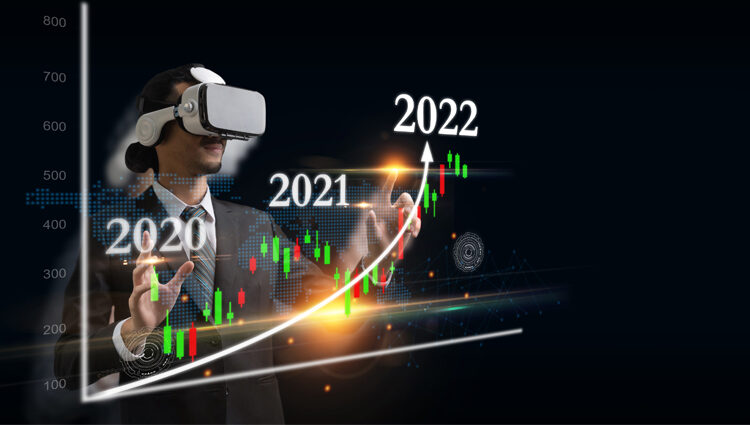Virtual reality (VR) is a rapidly growing industry, which currently holds a large share of all content produced worldwide, and VR headset shipments have also increased over the last two years.
VR also offers enterprise users and consumers immersive experiences for gameplay, learning new skills, collaboration, and remote productivity. If you are eager to know what is ahead for the thriving sector in 2022, here are the latest VR statistics and insights.
Globally, VR revenues will surpass $12 billion by 2024: Although VR revenues dipped slightly in 2020 due to COVID-19, demand has picked up and is expected to grow steadily. According to ARtillery Intelligence’s report, VR is expected to generate $6.7 billion in revenues.
HR is an important use case for VR in the enterprise, as per 92 percent of professionals: In a recent XR Association report, 92 percent of 250 human resource professionals surveyed viewed immersive technologies as a vital tool in the post-pandemic recovery phase.
Nearly 1 in 3 consumers own an AR/VR device, and 15 percent will buy such a device in 2022: As per a 2022 GroupM Annual Survey on Consumer Attitudes Towards Technology, 32 percent of respondents said they own an AR or VR device, and another 15 percent added they were looking to buy a device in this category in the next 12 months.
3.7 billion people globally are still offline and are locked out of VR adoption: Even as AR/VR goes mainstream, it is important to note that it remains inaccessible to many. The World Economic Forum found last year that 3.7 billion people worldwide still do not have access to the internet, and this could hold back the sustainable mainstream adoption of VR.
1 in 5 Meta employees now work on VR development: In 2021, social media giant Facebook pivoted towards VR and the metaverse by rebranding as Meta. According to a report from The Information, nearly 10,000 employees work in the company’s Reality Labs division, which is nearly a fifth of the company’s entire workforce.
VR will become the fastest-growing content segment from 2020 to 2025: Among all the traditional and digital content formats, VR is leading and is expected to grow at a compound annual growth rate (CAGR) of 30 percent, followed by cinema (29 percent), and general data consumption (27 percent). Conversely, newspapers, magazines, traditional TV, and home video will shrink 1 percent, forecasts PwC’s Global Entertainment & Media Outlook 2021–2025.
Facebook groups related to AR/VR have increased by 27 percent to 649 percent: Meta has launched a new quarterly series called Hello Future from Facebook IQ, which shows the number of Facebook groups related to AR/VR has increased exponentially year on year, with South Korea (649 percent) heading the list.
83 percent of industry leaders believe that the pace of investment in immersive technology will increase: According to a 2021 XR Industry Insider Survey of 164 professionals from across industries, the investment climate is bullish. It also found 83 percent said that the pace of investment will increase in 2022 and 37 percent expect a significantly higher pace of investment than in previous years.
More than 1 in 3 US consumers would rather buy AR/VR devices from Apple: Even though Apple is yet to launch a VR headset, it has a large number of loyalists. Roughly 33 percent of respondents to an said the preferred an Apple-provided headset as their first choice, followed by Google at 20 percent. Meta’s Quest is still the first choice for less than 10 percent of buyers.
Standalone VR headsets occupy 89.8 percent of global AR/VR headset shipments: In 2021, global shipments of AR/VR headsets grew by 348.4 percent as per an International Data Corporation (IDC) report. Standalone VR headsets held 89.8 percent of the market, which will continue to grow across the next few years, and headset shipments will also reach 15 million this year.
33 percent of UK customers and 29 percent of US customers do not know what the metaverse is: On one hand, companies are investing heavily in the metaverse – an integrated VR space where users can communicate, collaborate, play and learn – yet, market awareness has failed to reach the same momentum as nearly a third of consumers do not understand the metaverse. Another 36 percent in the UK and 27 percent in the US say they have no need for the metaverse, a 2021 Forrester survey found.
Social VR users spend over 3 hours a day in VR: According to a Social VR Lifestyle Survey 2021 survey, those engaging in social VR experiences spend over 3 hours a day in virtual reality. Interestingly, 75 percent said they maintain less physical distance between themselves and those they meet in VR than in real-world surroundings.
The mention of the word metaverse rose sharply in corporate earning calls, with the word being mentioned 73 times in Q2 2021: Morgan Stanley and other wealth management firms paid special attention to metaverse as an investment area in 2021. The company’s June edition of AlphaCurrents report mentioned the word 73 times in Q2, 2021, up from less than 10 times in Q4 the previous year.
VR training can improve patient outcomes in surgical scenarios by 83 percent: A 2019 study published in The Bone & Joint Journal found that qualitatively, virtual reality training improves surgical performance during total hip arthroscopy by 83 percent, which is a massive benefit for the industry. This could allow healthcare to become among the top sectors gaining from VR in 2022.
The following were our top virtual reality statistics and survey insights set to influence the industry in 2022.
This year promises to become a big one for VR, with several announcements expected from Meta and others, and VR already making a splash at CES. XR fans can follow this space for more VR statistics as the year unfolds.

